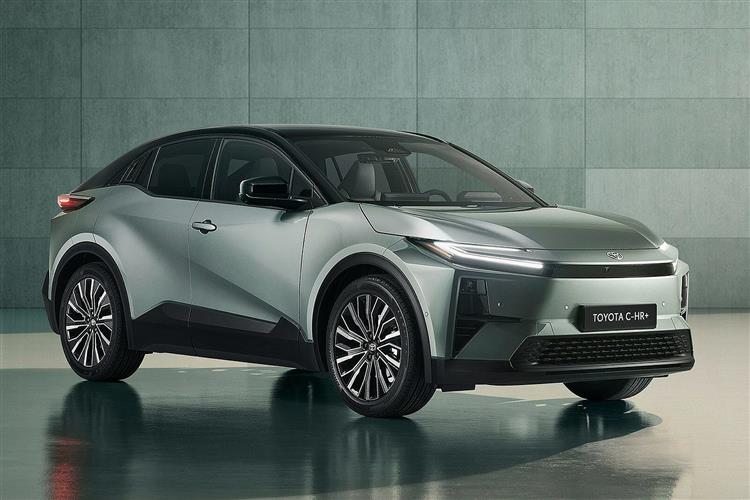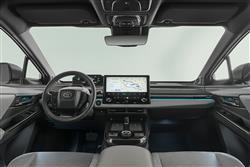PLUS POINTS (some text hidden) --NONE--
By Jonathan Crouch
The C-HR+ is Toyota's most significant EV yet. Jonathan Crouch takes a look.
Ten Second Reviewword count: 48
At last, Toyota is broadening its EV range downwards. Here's what looks likely to be the brand's strongest selling electric vehicle over the next few years, the C-HR+. It's actually a stand-alone model and will be a core contender for the company in the electric compact crossover segment.
Backgroundword count: 134
The bZ4X might have been Toyota's first self-developed EV, but this smaller C-HR+ model is considerably more significant. It's based on the brand's bZ Compact SUV Concept car of 2022 and was originally supposed to be called the 'bZ3X' until the company changed its EV naming convention. The C-HR+ slots into the Japanese maker's line-up just below the bZ4X just above the Urban Cruiser EV Toyota has co-developed with Suzuki. The C-HR+ name suggests a C-HR with an EV powertrain, but actually this EV is a completely stand-alone model - and a slightly bigger car than its Hybrid showroom stablemate. Toyota insists though that the two C-HR models share 'the same DNA' and says that the '+' suffix designates 'added versatility and practicality' as well as the EV drivetrain. Let's take a closer look.
Engines and Tech Specword count: 372
Things kick off in the C-HR+ range with an entry-level model featuring front wheel drive and a 165bhp motor energised by a 57.7kWh battery pack which gives you 283 miles of range. Next up is a front driven model with a 224bhp motor paired to a 77kWh battery which makes 62mph in 8.6s en route to the 100mph maximum all C-HR+ models share. It's the bigger-battery front driven version you'll obviously need for the best EV range figure - 378 miles. That bigger battery is also used by the top twin motor AWD version, which puts out a prodigious 343bhp and makes 62mph in just 5.2s. We didn't find the bZ4X model this car is based upon particularly fun to drive, but Toyota claims the C-HR+ is better, thanks to greater platform rigidity, bespoke-tuned suspension, stiffer anti-roll bars and more responsive steering. Don't expect it to handle in quite as agile a fashion as the C-HR Hybrid (there's too much extra kerb weight for that), but this EV's low centre of gravity helps with fast cornering. As does what Toyota calls 'a reduced moment of inertia'. Toyota claims that the electric power steering has been mapped for responsiveness, light at lower speeds and more directly-responsive at higher ones. The C-HR+ gets the latest lightweight Toyota eAxle - consisting of inverter, motor and transaxle - with silicon-carbide (SiC) semiconductors for efficiency and high-power output. The unit's design, incorporating cooling and lubrication systems, is supposed to minimise energy losses and deliver better power, stability and quieter performance. Refinement's been a priority too. Copious amounts of noise insulation and absorbing materials and silencers have been strategically installed to create a peaceful cabin environment. There are four levels of regenerative braking, selected using paddle shifts behind the steering wheel. The electric motor allows coasting deceleration of up to 0.15g when the driver releases the accelerator pedal, compensating for around 80 per cent of deceleration when driving. Only the 77kWh version can tow - but not much; up to 750kg. As usual with the brand, there's a wide range of standard Toyota Safety Sense features, including automatic activation when needed of braking, steering and power control. Plus a Parking Support Brake system to prevent car park prangs.
To see the full road test text contact us on 0330 0020 227
Pictures (high res disabled)

.jpg)
|
.jpg)
|
.jpg)
| |||
.jpg)
|
.jpg)
|
.jpg)
| |||
.jpg)
|
.jpg)
|

|
Statistics (subset of data only)
Min |
Max |
|
Price: |
£42,000.00 (At 2 Jun 2025, est) |
|
Max Speed (mph): |
87 (57.7kWh) |
99 (77kWh) |
0-62 mph (s): |
8.4 (57.7kWh) |
7.3 (77kWh) |
Electric WLTP-Rated Driving Range (miles): |
283 |
|
Length (mm): |
4520 |
|
Width (mm): |
1870 |
|
Height (mm): |
1595 |
|
Boot Capacity (l): |
416 |
|
Power (ps): |
165 (57.7) |
221 (77kWh) |
Torque (lb ft): |
268 |
|



